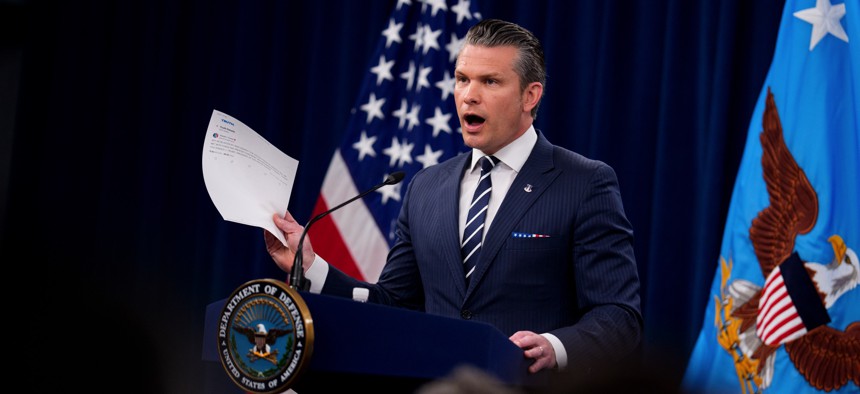
U.S. strikes on three Iranian nuclear facilities Saturday night are not meant to initiate another forever war, Defense Secretary Pete Hegseth told reporters Sunday during the first live press briefing of his tenure.
The offensive attacks destroyed the compounds at Fordow, Natanz, and Isfahan and “obliterated” Iran’s nuclear ambitions, Hegseth said, adding that the bombings were part of an attempt to deter the country from creating a nuclear weapon and to force them into a negotiated settlement.
“I would just say, as the president has directed, made clear, this is most certainly not open-ended,” Hegseth said. “It doesn’t mean it limits our ability to respond. We will respond if necessary.”
The strikes were the first American offensive action of the war that began on June 13, when Israel launched a surprise attack on Iran. When Iran retaliated with its own missiles and drones, U.S. forces helped shoot down incoming weapons.
Asked whether the situation could escalate if Iran chooses to retaliate against the United States, Hegseth left everything on the table.
“Well, anything can happen in conflict. We acknowledge that, but the scope of this was intentionally limited,” he said. “That’s the message that we’re sending, with the capabilities of the American military nearly unlimited.”
Dubbed Operation Midnight Hammer, the mission saw the first use of the GBU-57 Massive Ordnance Penetrator, Air Force Gen. Dan Caine, chairman of the Joint Chiefs of Staff, told reporters.
Seven B-2 bombers took off on Friday night, splitting up so that some flew over the Pacific as a decoy. Once over Iran, the bombers came in behind strike fighter jets acting as decoys, then dropped 14 GBU-57s on Fordow and Natanz. U.S. submarines in the Persian Gulf also fired two dozen Tomahawk missiles at Isfahan.
If the Iranian military was aware of the U.S. presence, they did not respond, Caine said.
“Iran’s fighters did not fly, and it appears that Iran’s surface-to-air missile systems did not see us throughout the mission,” he said.
Hegseth gave President Trump credit for planning the mission, calling it “bold” and “brilliant.”
Caine took a moment to praise the operational security around the mission, a reminder that Hegseth shared details of previous strikes on Houthi targets in Yemen, on unsecured Signal chats that included his wife and the editor of The Atlantic.
Hegseth said that there are “public and private messages being directly delivered to the Iranians in multiple channels, giving them every opportunity to come to the table…They understand precisely what the American position is, precisely what steps they can take to allow for peace, and we hope they do so.”
In a press conference Saturday night, Trump threatened Iran with further strikes if it does not submit to a peace agreement, saying, “Remember, there are many more targets left.”
The post US strikes on Iran not a step toward ‘open-ended war,’ SecDef says appeared first on Defense One.




